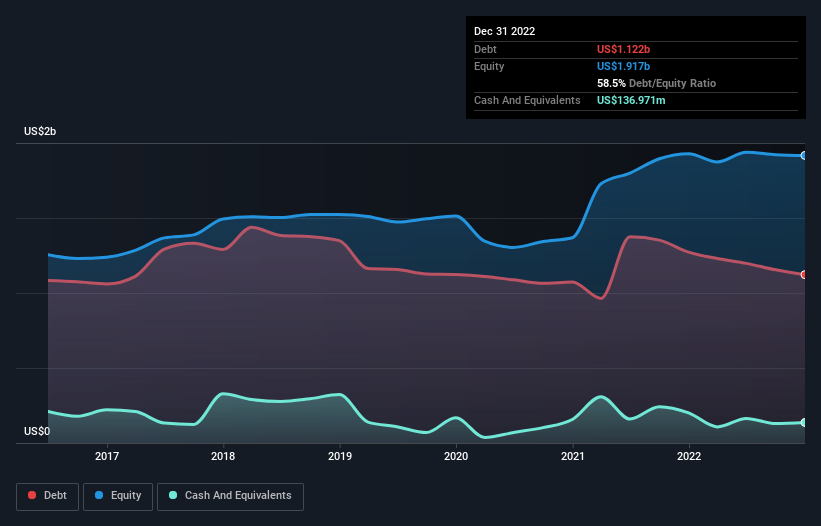- United States
- /
- Marine and Shipping
- /
- NasdaqGS:GOGL
These 4 Measures Indicate That Golden Ocean Group (NASDAQ:GOGL) Is Using Debt Extensively

Legendary fund manager Li Lu (who Charlie Munger backed) once said, 'The biggest investment risk is not the volatility of prices, but whether you will suffer a permanent loss of capital.' So it might be obvious that you need to consider debt, when you think about how risky any given stock is, because too much debt can sink a company. We can see that Golden Ocean Group Limited (NASDAQ:GOGL) does use debt in its business. But the more important question is: how much risk is that debt creating?
What Risk Does Debt Bring?
Debt is a tool to help businesses grow, but if a business is incapable of paying off its lenders, then it exists at their mercy. Ultimately, if the company can't fulfill its legal obligations to repay debt, shareholders could walk away with nothing. While that is not too common, we often do see indebted companies permanently diluting shareholders because lenders force them to raise capital at a distressed price. Of course, the upside of debt is that it often represents cheap capital, especially when it replaces dilution in a company with the ability to reinvest at high rates of return. When we think about a company's use of debt, we first look at cash and debt together.
Check out our latest analysis for Golden Ocean Group
What Is Golden Ocean Group's Net Debt?
As you can see below, Golden Ocean Group had US$1.12b of debt at December 2022, down from US$1.27b a year prior. On the flip side, it has US$137.0m in cash leading to net debt of about US$985.2m.

How Strong Is Golden Ocean Group's Balance Sheet?
The latest balance sheet data shows that Golden Ocean Group had liabilities of US$211.6m due within a year, and liabilities of US$1.13b falling due after that. Offsetting this, it had US$137.0m in cash and US$79.5m in receivables that were due within 12 months. So it has liabilities totalling US$1.12b more than its cash and near-term receivables, combined.
This deficit is considerable relative to its market capitalization of US$1.79b, so it does suggest shareholders should keep an eye on Golden Ocean Group's use of debt. This suggests shareholders would be heavily diluted if the company needed to shore up its balance sheet in a hurry.
We use two main ratios to inform us about debt levels relative to earnings. The first is net debt divided by earnings before interest, tax, depreciation, and amortization (EBITDA), while the second is how many times its earnings before interest and tax (EBIT) covers its interest expense (or its interest cover, for short). This way, we consider both the absolute quantum of the debt, as well as the interest rates paid on it.
Golden Ocean Group's net debt to EBITDA ratio of about 1.9 suggests only moderate use of debt. And its commanding EBIT of 29.1 times its interest expense, implies the debt load is as light as a peacock feather. Shareholders should be aware that Golden Ocean Group's EBIT was down 21% last year. If that decline continues then paying off debt will be harder than selling foie gras at a vegan convention. The balance sheet is clearly the area to focus on when you are analysing debt. But ultimately the future profitability of the business will decide if Golden Ocean Group can strengthen its balance sheet over time. So if you want to see what the professionals think, you might find this free report on analyst profit forecasts to be interesting.
Finally, a business needs free cash flow to pay off debt; accounting profits just don't cut it. So the logical step is to look at the proportion of that EBIT that is matched by actual free cash flow. Over the most recent three years, Golden Ocean Group recorded free cash flow worth 71% of its EBIT, which is around normal, given free cash flow excludes interest and tax. This free cash flow puts the company in a good position to pay down debt, when appropriate.
Our View
We feel some trepidation about Golden Ocean Group's difficulty EBIT growth rate, but we've got positives to focus on, too. To wit both its interest cover and conversion of EBIT to free cash flow were encouraging signs. Looking at all the angles mentioned above, it does seem to us that Golden Ocean Group is a somewhat risky investment as a result of its debt. That's not necessarily a bad thing, since leverage can boost returns on equity, but it is something to be aware of. There's no doubt that we learn most about debt from the balance sheet. However, not all investment risk resides within the balance sheet - far from it. For example Golden Ocean Group has 3 warning signs (and 1 which can't be ignored) we think you should know about.
At the end of the day, it's often better to focus on companies that are free from net debt. You can access our special list of such companies (all with a track record of profit growth). It's free.
New: Manage All Your Stock Portfolios in One Place
We've created the ultimate portfolio companion for stock investors, and it's free.
• Connect an unlimited number of Portfolios and see your total in one currency
• Be alerted to new Warning Signs or Risks via email or mobile
• Track the Fair Value of your stocks
Have feedback on this article? Concerned about the content? Get in touch with us directly. Alternatively, email editorial-team (at) simplywallst.com.
This article by Simply Wall St is general in nature. We provide commentary based on historical data and analyst forecasts only using an unbiased methodology and our articles are not intended to be financial advice. It does not constitute a recommendation to buy or sell any stock, and does not take account of your objectives, or your financial situation. We aim to bring you long-term focused analysis driven by fundamental data. Note that our analysis may not factor in the latest price-sensitive company announcements or qualitative material. Simply Wall St has no position in any stocks mentioned.
About NasdaqGS:GOGL
Golden Ocean Group
A shipping company, owns and operates a fleet of dry bulk vessels worldwide.
Solid track record with adequate balance sheet.
Similar Companies
Market Insights
Community Narratives



